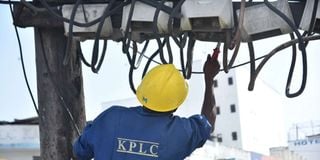Public outcry over the government’s move to raise electricity prices

A Kenya Power employee carries out repairs on Haile Selassie Road, Mombasa. The Energy and Petroleum Regulatory Authority on Friday raised base power tariffs by up to 63 per cent in the first tariff review since July 2018.
Kenyans have opposed the government’s move to raise electricity prices, with many taking to social media to vent their anger, even as some vowed to switch to alternative power sources such as solar to avoid the growing costs.
The energy regulator on Friday raised base power tariffs by up to 63 per cent in the first tariff review since July 2018 at a time consumers are reeling from a high cost of living amid increased costs of food, fuel, cooking gas, transport and other commodities and services.
“It is time for solar. How can I import a complete solar unit?” posed one user on Twitter.
“This is not right. Something is very wrong about this decision and it will cost our country dearly,’ added another user.
The higher prices will not only hit domestic consumers but also commercial and industrial customers such as manufacturers who had opposed the prices increase, arguing that it would sharply increase their operational costs.
The Kenya Association of Manufacturers (KAM) had argued that the new tariffs would see the cost of electricity for manufacturers increase by between Sh3.5 and Sh5 per unit, translating to a 38 per cent cost increase, depending on their respective tariff and consumption levels.
“Manufacturers have over time raised concerns over the high cost of electricity in the country, which impacts on the overall cost of production,” argued KAM during a stakeholder engagement process before the new tariffs were approved.
“It is impossible for the country to be competitive as an investment destination and therefore industrialise in the absence of affordable, reliable, quality, and sustainable electricity for the manufacturing industry,” said the lobby.
The higher power costs come at a time inflation has once again gathered fresh steam, climbing to 9.2 per cent in February, coming after it slowed for three consecutive months to hit nine per cent in January.
The Kenya National Bureau of Statistics (KNBS) Consumer Price Index (CPI) showed that high prices of basic food commodities such as maize flour, cooking oil, rice, beans and wheat contributed greatly to the high inflation.
The Energy and Petroleum Regulatory Authority(Epra) on Friday raised the base power prices to Sh12.22 per unit from Sh10 for those consuming below 30 units further marking a 22.2 per cent jump, putting pressure on consumers.
It also increased the base prices for those using between 30-100 units from Sh10 to Sh16.3, an equivalent of 63 per cent effective April while those consuming more than 100 units of electricity will now pay Sh20.97 per unit up from Sh15.8 currently, which is an equivalent of a 32per cent jump.
The new tariffs are slightly lower than what Kenya Power had submitted for review and approval in October. Kenya Power’s request would have seen electricity prices rise by up to 73 per cent.
Kenya Power revenues
The newly-approved tariffs will see Kenya Power net Sh177 billion in revenues in the current 2022/2023 financial year—some Sh18 billion lower compared to the Sh195 billion the utility firm had targeted in its application to Epra.
Based on the new tariffs, Kenya Power will net Sh184.9 billion, Sh189.6 billion, and Sh193.7 billion in revenues for the financial years 2023/23,2024/25, and 2025/26 respectively.
Kenya Power yesterday welcomed the new tariffs, stating that they would help enhance power supply quality.
“Epra has approved target benchmarks that Kenya Power should achieve over the period of the tariffs in order to ensure accountability and proper use of the resources availed to them. This provides an incentive to Kenya Power to consistently improve on power quality and reliability,” said the utility in a statement.
This also comes at a time some 11 independent power producers (IPPs) have been summoned by Members of Parliament as investigations into contracts signed by the firms to supply electricity to Kenya Power begin.
The lawmakers want the 11 firms to explain how much they are selling electricity to Kenya Power and why they are being paid in foreign currencies, mainly in US dollars and Euros.
The development comes after the Electricity Consumers Society of Kenya decried the skewed contracts signed between Kenya and the IPPs that are burdening consumers with high power costs.
Epra said the proposed tariffs will ensure Kenya Power meets its power purchase and financial obligations. “It will also ensure improved service delivery by scaling up refurbishment and upgrade of transmission and distribution system” the regulator said.





